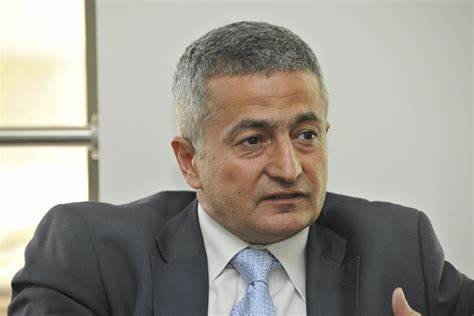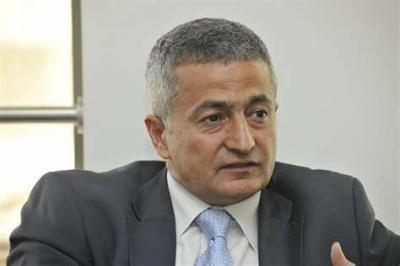Finance Minister in the caretaker government, Youssef Khalil, confirmed that "public sector salaries are secured and serious meetings will be held with the deputy governors of the Central Bank this week to reach an agreement on lending to the government." He announced that "the 2023 budget project being discussed by the Council of Ministers is nearing its completion. It is a continuation of the financial correction and recovery process that began with the approval of the 2022 budget, which was followed by several implementation measures, leading to an enhancement of expected revenues for 2023 to approximately 8-9% of GDP, compared to about 6% of GDP in 2022."
Khalil said during a work meeting held at the Ministry of Finance, which included the International Monetary Fund representative in Lebanon, Federico Lima, and a delegation from the Fund to discuss topics related to financial management and the 2023 budget project: "Although the completion of the 2023 budget project and its presentation to the Council of Ministers comes late and outside of the constitutional deadlines, its importance lies in completing corrective measures and reducing distortions and gaps resulting from the multiple exchange rates in the economy, which should enhance revenues and contribute to restoring resources for the benefit of the public treasury."
He clarified that "the budget does not impose new taxes on citizens as some believe, but it corrects the values of some taxes, fees, and licenses that have become very low and do not cover the cost of services provided amid the depreciation of the exchange rate, necessitating their adjustment." Khalil pointed out that "the tax burden has decreased from 16% before the crisis to an estimated 4% in 2022. On the contrary, adapting tax policies to inflation rates prevents shifting additional burdens onto taxpayers due to macroeconomic fluctuations (Indexation). Moreover, the 2023 budget project addresses the re-evaluation of assets and inventories, among other measures aimed at correcting the impact of currency depreciation on taxpayers."
He added: "The budget project also addresses enhancing tax compliance and reducing evasion and expanding the tax base by targeting the informal sector, which has grown in recent years due to the crisis and the cash economy, for instance, by correcting the values of fines that no longer serve their intended purpose, especially in incentivizing tax compliance."
In response to claims that the 2023 budget lacks the expected reforms, the Finance Minister confirmed that "the ministry, alongside finalizing the 2023 budget project and preparing the 2024 budget project within constitutional deadlines, despite all obstacles regarding the living conditions of public sector employees and their difficulties in maintaining continuous work hours, as well as lack of technological and administrative capabilities and the non-availability of financial data, is striving to establish an independent draft law aimed at completing the necessary tax and financial reforms in support of and in alignment with the government's financial and economic reform program."




